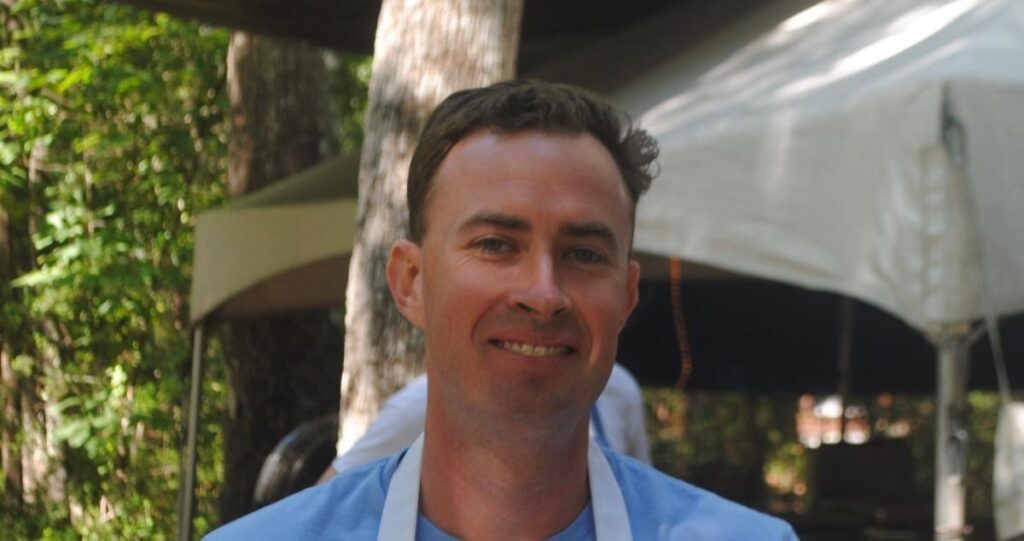
November 25, 2022
A Fortunate Responsibility
“This place is not a retreat for me,” Joe Dunn says of Meher Center. Every workday, Joe drives to the Center, parks his truck, walks to the maintenance shop, and begins his constant meticulous work of tending and repairing and rebuilding.
Joe grew up in Myrtle Beach and spent time “running around the Center” ever since he could remember. But as is true for many young people, he developed his own connection with Baba at the Youth Sahavas: he discovered Baba’s love in the camaraderie and the “enchanting” atmosphere of the Center during Sahavas.
Joe’s family moved away from Myrtle Beach for a few of his teenage years, but he moved back in 2007. That was when Lee McBride, the head of Maintenance who had known him since he was a little boy hammering away on forts in the neighborhood, asked if he wanted to do some work on Center. It wasn’t a permanent position, but still the three “old-timers” on the crew took him under their wing, began to teach him the ins and outs of caring for the Center and maintenance in general.
After a few years, Joe moved to Asheville and started working for another Baba lover building houses. He learned a lot, but after a few years he started to miss the Center and feel like, if this was going to be his profession, he’d rather do it there. “I really got along with my construction crew in Asheville and so it was a bittersweet leaving, but I just felt like my time was up, and it was time to go home.”
So, seven years ago this week, on his birthday, Joe started his long-term, full-time work on the Center.
When he first got back, Joe describes, “I kinda felt Baba’s presence in my life a little more. It was kinda noticeable. I felt a cheerful happiness.” It was a wonderful feeling, but it wouldn’t be the main way Joe connected with Baba on the Center in the years to come. That would be through the work itself.
It was different working on the Center than it was working in what Joe calls the “real world,” and Joe could see that, from the beginning, even doing something as minor as fixing a sink or replacing a baseboard. “I’ve learned by watching Dean and Lee and seeing their dedication and attention to little details, stuff that you could never get away with in the real world because nobody’s going to pay to take that much time to do this little detail most people would just overlook.” But on the Center, Baba’s home, there’s a tradition and a commitment to tending to everything as carefully as we can—because of love. Joe says, “I’m getting paid to do this, but I’m also trying to do this for Baba.”
Remembering Baba helps Joe with the painstaking work. “If I’m doing something to Baba’s house [or other places where Baba spent time] I like to think about that … I’ll try to make a conscious effort to focus on Baba when I’m working sometimes, and I think that makes it easier to do a more thorough job. Especially if I get frustrated with something—you know, a bunch of things are going wrong or whatever—I think, ‘Well, this is Baba making me cut this wrong first, or measure wrong first, and I’ve gotta re-do it.’ Or if a bunch of little steps are going wrong—I’ve just gotta keep doing it.”
I asked Joe whether there was a certain project over the years that was particularly special to him, and, after a thoughtful moment, he said there was. When the Barn was vandalized in 2016, Joe was one of the primary people working to fix it. After they had repaired all the damage, they had the privilege of re-painting that Mediterranean blue ceiling and re-varnishing the paneling that went over the rough-hewn Barn walls.
That job was a privilege, but it was not easy or pleasant. The walls are what is called “pickwick,” and all the detailing had to be sanded by hand. Joe and a coworker spent months sanding every day. Joe hurt his shoulder through the repetitive movement, and they filled a trashcan and a half with used sandpaper. But like working on the Center in general, along with the details and the difficulties, there was something more. “That’s a sacred building and it’s a very special and unique building … I’m glad I got an opportunity to spend so much time there. And you know, it had never been restored since those walls were first varnished and the blue ceiling choice painted—it had never been redone. So that was the first time, seventy or so years later.”
No, the Center is not a retreat for Joe. It’s the place where he first learned his profession, and the place where every day he puts it into practice, as carefully and methodically and lovingly as he can. “It takes all my time. Sometimes I can’t stand it,” he says wryly. But then he adds, “But that doesn’t last long.” He says that the “old-timers” often say how lucky he is to be here, and that feeling has grown over time. “I do feel fortunate that I’m trusted to work here and take care of this place and that it is a good fit. It feels right to be here, and I think that’s growing exponentially … like I said, I look at this place as a responsibility kind of. But a fortunate responsibility.”